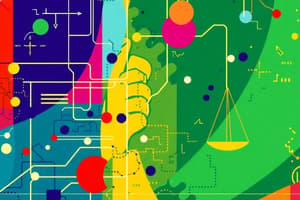Podcast
Questions and Answers
What does hardware refer to in a computer system?
What does hardware refer to in a computer system?
- The instructions that tell computers what to do
- Applications and programs
- The physical components like microprocessors and memory devices (correct)
- Data stored temporarily in RAM
Which component is responsible for executing instructions from programs?
Which component is responsible for executing instructions from programs?
- Output devices
- Memory devices
- Storage units
- Microprocessors (correct)
What type of memory stores data permanently and cannot be changed after manufacturing?
What type of memory stores data permanently and cannot be changed after manufacturing?
- Solid-state drives (SSDs)
- Random Access Memory (RAM)
- Read-Only Memory (ROM) (correct)
- Hard disk drives (HDDs)
Which component of a computer system holds information for an extended period even without power?
Which component of a computer system holds information for an extended period even without power?
What do software components include?
What do software components include?
What type of devices allow users to communicate with the computer?
What type of devices allow users to communicate with the computer?
Which type of software controls a computer's operations and ensures its smooth functioning?
Which type of software controls a computer's operations and ensures its smooth functioning?
What type of devices display the results of a computer's processing?
What type of devices display the results of a computer's processing?
Which of the following is used to write software programs by providing instructions that can be understood and executed by computers?
Which of the following is used to write software programs by providing instructions that can be understood and executed by computers?
Which category of software includes various types of programs designed for specific tasks, such as web browsers and word processors?
Which category of software includes various types of programs designed for specific tasks, such as web browsers and word processors?
Flashcards are hidden until you start studying
Study Notes
Computer Education: Exploring Hardware and Software Fundamentals
Computer education is a crucial aspect of our modern world, with technology playing an increasingly significant role in both personal and professional spheres. This article aims to provide you with foundational knowledge on computer education by delving into two essential components: hardware and software.
Overview
Hardware refers to the physical components of a computer system such as microprocessors, memory devices, storage units, input devices, output devices, and communication devices. On the other hand, software encompasses the instructions that tell computers what to do. It includes applications, programs, operating systems, and utilities.
Hardware Components
Microprocessors
Microprocessors form the core of digital electronic systems, including computers. They are responsible for executing instructions from the program stored within the memory unit.
Memory Devices
Memory devices store data used by the computer temporarily while it's in operation, and permanently when the power source is removed. There are various types of memory, such as Random Access Memory (RAM), which stores temporary data, and Read-Only Memory (ROM) where information cannot be changed after manufacturing.
Storage Units
Storage units hold information for an extended period, even when the power source is removed. They include hard disk drives (HDDs), solid-state drives (SSDs), and external storage devices.
Input Devices
Input devices allow users to communicate with the computer, such as keyboards, mice, and scanners.
Output Devices
Output devices display the results of a computer's processing, including monitors, printers, and speakers.
Communication Devices
Communication devices enable computers to interact with other devices or networks, like modems and routers.
Software Components
Programming Language
Programming languages are used to write software programs by providing instructions that can be understood and executed by computers. Examples include Python, Java, and Fortran.
Application Software
Application software includes various types of programs designed for specific tasks, such as web browsers, word processors, and multimedia editors.
System Software
System software controls a computer's operations and ensures its smooth functioning. It includes operating systems like Windows and macOS and utility programs.
Understanding these fundamental concepts is vital for anyone seeking a career in computing or simply wanting to use computers more effectively. While the technology landscape is vast and dynamic, foundational knowledge of hardware and software allows individuals to navigate this rapidly evolving field with confidence.
Studying That Suits You
Use AI to generate personalized quizzes and flashcards to suit your learning preferences.



